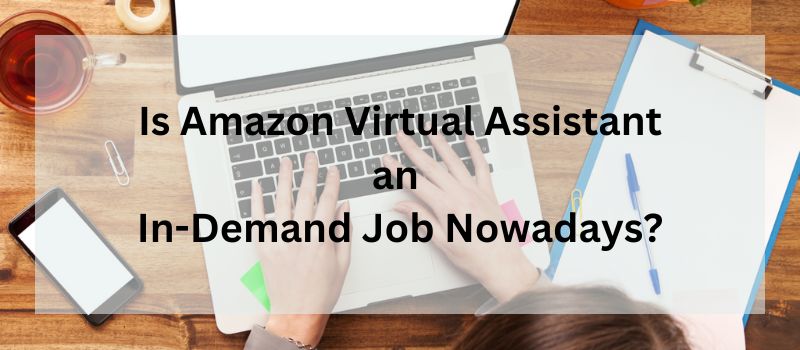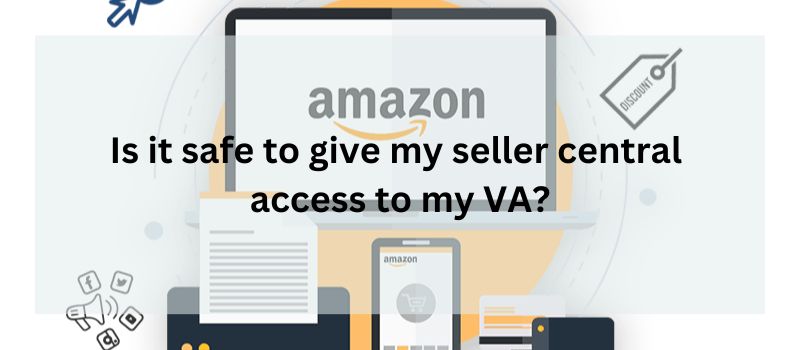Is Amazon Affiliate batter then Amazon VA? is the most asked question by many freelancer, small businesses and students. I as an Amazon Fba expert answer you all queries, answer your all questions and tries to make this concept clear that what is more effective and batter?
As an Amazon seller, you’re likely always looking for new ways to grow your business and boost revenue streams. Two popular options are Amazon Affiliate marketing and hiring an Amazon Virtual Assistant (VA). But which one is actually the better choice for your ecommerce business? You’re probably curious to weigh the pros and cons of each model.
In this post, I’ll provide an in-depth comparison of Amazon Affiliate marketing versus using a dedicated Amazon virtual assistant. You’ll get a balanced perspective on the unique benefits and challenges of each approach. My goal is to help you make an informed decision on which strategy (or combination of both!) is right for optimizing your Amazon selling business.

Contents
- 1 Is Amazon Affiliate batter then Amazon VA?
- 1.1 What is Amazon Affiliate Marketing?
- 1.2 The Potential Benefits of Amazon Affiliate Marketing
- 1.3 Some Potential Downsides to Consider with Amazon Affiliate Marketing
- 1.4 What is an Amazon Virtual Assistant?
- 1.5 The Advantages of Working with an Amazon VA
- 1.6 Some Challenges to Keep in Mind with Hiring an Amazon VA
- 1.7 Key Differences and Factors to Consider Between Amazon Affiliate Marketing and Amazon VAs
- 1.8 The Verdict: Can Amazon Affiliate and VA Work Together?
- 1.9 The Bottom Line – Evaluating the Right Options for Your Amazon Business
- 2 FAQs:
- 2.1 Q2: What’s the main difference between Amazon Affiliate and VA?
- 2.2 Q2: Which makes more money – Amazon Affiliate or VA?
- 2.3 Q3: Is it better to have an Amazon VA or do Affiliate marketing?
- 2.4 Q4: Can I make a full time income with Amazon Affiliate?
- 2.5 Q5: Should I get an Amazon VA before starting Affiliate marketing?
- 2.6 Q6: What are the monthly costs of an Amazon VA?
- 3 Conclusion:
Is Amazon Affiliate batter then Amazon VA?
Neither is necessarily “better” – it depends on your business goals and bandwidth. Affiliate marketing provides passive supplemental income, while a knowledgeable Amazon virtual assistant can optimize core operations. Using both together can be quite powerful for revenue growth.
What is Amazon Affiliate Marketing?
For those unfamiliar, Amazon Affiliate marketing essentially allows you to earn commissions by promoting Amazon products on your website, social media, YouTube channel etc. As an Amazon Associate, you receive an affiliate commission on resulting sales when someone clicks your link and purchases that product on Amazon.
It’s free to sign up for the Amazon Associates program and start sharing your affiliate links. Amazon handles the entire customer experience including product fulfillment and customer service after the referral. So it’s a relatively passive, hands-off approach to generating additional income from your audience and platforms.
The Potential Benefits of Amazon Affiliate Marketing
Given it’s simple to get started and requires little maintenance, Amazon Affiliate marketing offers some clear advantages:
- Low barrier to entry – Anyone can easily sign up for an Amazon affiliate account and start sharing links. There are no upfront costs associated with joining the program.
- Trusted brand name – Amazon is a household name that shoppers already know and trust. Many feel comfortable buying from Amazon.
- Huge product selection – As the “everything store”, you can essentially promote any type of physical, digital or even Amazon services like Kindle Unlimited subscriptions.
- Hands-off passive income potential – Amazon handles all the backend work so you simply have to focus on driving traffic and referrals.
- Free to join and maintain – It’s completely free to become an Amazon Associate. There are no monthly fees or minimum sales requirements to worry about.
With over 200 million customers shopping on Amazon, their massive reach and brand authority makes it easy to generate quick commissions through affiliate links. If you already have an audience, affiliate marketing could be an easy way to monetize the traffic you’re getting without selling your own products.
Some Potential Downsides to Consider with Amazon Affiliate Marketing
However, Amazon Affiliate marketing isn’t without some risks and downdes to consider:
- Commissions can change – Amazon dictates the commission rates which may fluctuate over time. Rates vary by product category.
- Account suspension risk – Violating Amazon’s terms could get your affiliate account suspended with little warning.
- Need significant traffic volume – It takes a substantial amount of visitors clicking your links to generate meaningful income.
- Limited ability to build brand – You don’t own the customer relationship beyond the transaction.
As you can see, the passive nature of Amazon affiliate marketing also means you don’t have much control over your destiny. You’re largely reliance on Amazon’s platform and terms. Significant traffic is essential for decent earnings. Next, let’s compare this to the alternative.

What is an Amazon Virtual Assistant?
In contrast to passive affiliate marketing, hiring an Amazon fba Virtual Assistant (VA) gives you an active team member providing hands-on support for your Amazon selling business.
Amazon VAs are essentially independent contractors who become an extension of your team. They can provide a range of highly-customized services:
- Product research
- Listing optimization
- Inventory and supply chain management
- Customer service
- Revenue forecasting and reporting
- Promotions and PPC campaign management
You can work with a Amazon virtual assistant part-time or full-time on an ongoing basis to optimize various parts of your ecommerce operations. Top performers become invaluable assets for scaling your business.
The Advantages of Working with an Amazon VA
Despite the additional costs, hiring an Amazon virtual assistant has some compelling benefits:
- Personalized support – Get 1-on-1 guidance tailored to your exact business needs.
- Outsource tedious tasks – Free up more of your time by delegating admin work to your Amazon virtual assistant.
- Focus on strategy – Spend your time on high-level growth opportunities.
- Build relationships – Get to know your VA’s strengths over time.
- Scalable growth – Easily increase or reduce hours based on your needs.
- Cost-effective – Pay only for actual hours worked vs. fixed employee costs.
The right Amazon virtual assistant becomes an invaluable asset – giving you peace of mind that your backend operations are handled while you focus on big picture strategy. This human touch and custom support can be a key advantage over passive affiliate marketing.
Some Challenges to Keep in Mind with Hiring an Amazon VA
However, it’s not as simple as signing up for an affiliate account. There are some real challenges to weigh when bringing on an Amazon VA:
- Time investment to find and vet Amazon virtual assistantFFs – It takes time to interview and find the right fit. Expect a learning curve.
- Must provide training and guidance – You’ll need to train your Amazon virtual assistant on your processes and preferences.
- VA management – You’re responsible for delegating tasks, overseeing progress and troubleshooting.
- Additional overhead costs – While more affordable than employees, VAs still add operating costs.
- Risk of underperformance – A bad hire can negatively impact operations. High turnover is also common.
Having an underqualified or ineffective Amazon fba virtual assistant could potentially do more harm than good for your business. Dedicating the time upfront to find and train the right person is critical.
Key Differences and Factors to Consider Between Amazon Affiliate Marketing and Amazon VAs
Now that we’ve explored the core benefits and challenges of each model, let’s summarize some of the key differences:
- Affiliate marketing is passive, VA model requires active management
- VA helps build sustainable business, affiliate revenue may fluctuate
- Need significant traffic for affiliate income, VA impact tied to individual performance
- Affiliate purely supplemental income, VA part of core operations
Evaluating these differences, a few important factors emerge:
- Your available time – passive vs. active oversight
- Revenue goals – supplemental vs. core stream
- Stage of business – early vs. established
- Overall ecommerce strategy – focused vs. diversified
Analyzing these dynamics will help determine the better option for your specific situation.
The Verdict: Can Amazon Affiliate and VA Work Together?
Given the fundamentally different nature of each model, Amazon Affiliate marketing and utilizing a VA are not necessarily mutually exclusive approaches.
In fact, many sellers are able to reap the benefits of both strategies when executed thoughtfully. Here are a few pointers on effectively combining affiliate marketing and Amazon virtual assistants:
- Focus on core ecommerce operations first before expanding into affiliate promos to ensure you have capacity.
- Consider hire Amazon virtual assistant for crucial backend tasks so you can devote time to affiliate content creation.
- Use affiliate links minimally on your website/content to complement main products – don’t let it distract from core brand.
- Once you have refined operations and processes, affiliate marketing is a great way to scale growth and reach.
The reality is that concentrating solely on affiliate promotions as your main monetization method is risky. But when balanced properly as a supplementary income stream, affiliate marketing can be quite lucrative.
Having qualified support from a Amazon virtual assistant maximizes efficiency of day-to-day ecommerce management. This frees up time for you to drive affiliate traffic – creating synergy between the two models.

The Bottom Line – Evaluating the Right Options for Your Amazon Business
When it comes to deciding whether Amazon Affiliate marketing or hiring an Amazon Virtual Assistant is the better choice, there are compelling benefits and drawbacks to both approaches.
Ultimately the right strategy depends primarily on your specific business goals, current needs and bandwidth.
For newer sellers focused purely on Amazon, affiliate marketing provides a turnkey way to generate incremental revenue from your audience and platforms. The passive nature and low barrier to entry are advantages.
However, as your operations grow in scale and complexity, the value of a qualified Amazon fba virtual assistant specialized in Amazon management becomes more pronounced. Their hands-on support not only improves efficiency but also allows you to focus on expansion.
Ideally once you’ve refined core operations, you’re positioned well to take advantage of affiliate marketing passive income in addition to your main products or services.
By understanding the core differences between the two models, you can determine the right strategy or combination that aligns to your overall ecommerce goals and take steps towards executing your plan.
Hopefully this detailed look at Amazon Affiliate marketing vs Virtual Assistants provides clarity on which approach (or blend of both) suits your unique situation. Let me know if you have any other specific questions!
FAQs:
Q2: What’s the main difference between Amazon Affiliate and VA?
Affiliate is passive income from promoting links while a VA actively manages tasks for your business.
Q2: Which makes more money – Amazon Affiliate or VA?
Affiliate income relies heavily on traffic volume. A good Amazon virtual assistant optimizes operations to increase overall sales.
Q3: Is it better to have an Amazon VA or do Affiliate marketing?
It depends on your goals and capacity. Using both together is a powerful combo long-term.
Q4: Can I make a full time income with Amazon Affiliate?
It’s possible but unlikely for most. Significant traffic is needed to generate a full income from affiliate alone.
Q5: Should I get an Amazon VA before starting Affiliate marketing?
Focus on core operations first. Then expand into affiliate income once you’ve optimized your processes.
Q6: What are the monthly costs of an Amazon VA?
Costs vary based on hours and services needed, but expect to invest at least $500-$2000 per month.
Conclusion:
After comparing the pros and cons in depth, it’s clear Amazon Affiliate and Amazon fba virtual assistant strategies both bring unique advantages to the table. The ideal approach depends on your specific goals and capacity as a seller.
If you’re just starting out, affiliate marketing provides an easy way to dip your toes into supplemental income without overextending yourself. But as your business grows, don’t underestimate the power of a skilled Amazon virtual assistant to optimize operations so you can focus on high-level growth.
Ultimately, having both passive affiliate earnings and hands-on Amazon virtual assistant support is the winning combo for sustained revenue. But you have to walk before you can run. So take it step-by-step and find the right balance for your needs.
No need to lose sleep anymore over this decision! Evaluating your business maturity and bandwidth will illuminate the ideal path forward. Now that you understand the key differences between each model, you can confidently move ahead with an affiliate marketing or Amazon virtual assistant plan tailored for your Amazon selling goals.
Remember, even successful entrepreneurs need support. So whether you choose to outsource tasks to a skilled Amazon virtual assistant or leverage affiliate links for passive commissions (or both!), explore options that allow you to play to your strengths while optimizing growth. The right revenue model is out there – go seize it!
Get My Free Consultation to Choosing the Right Affiliate & VA Strategy!
Read More:



